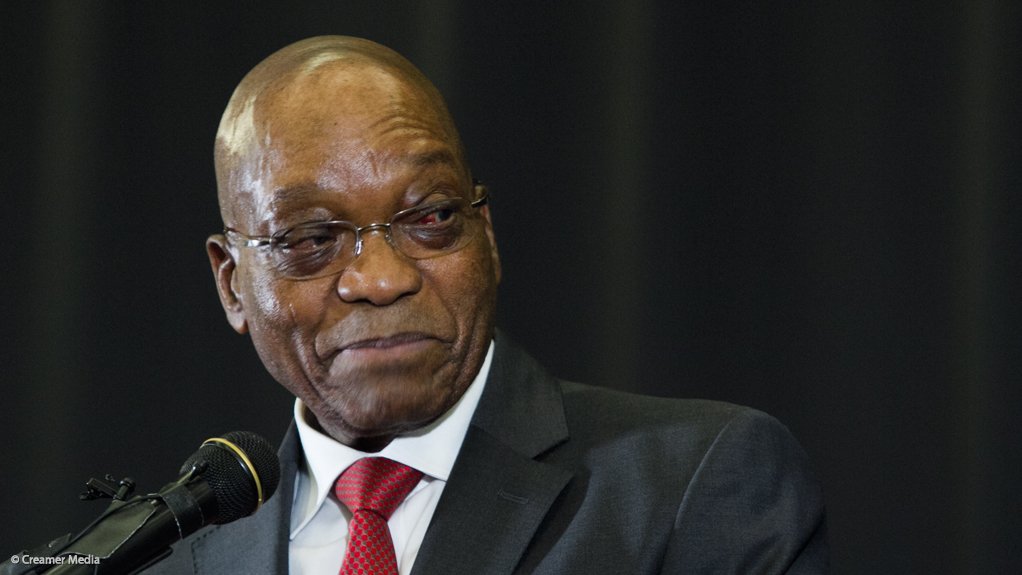JOHANNESBURG (miningweekly.com) – President Jacob Zuma sent the Mining and Petroleum Resources Development Act (MPRDA) Amendment Bill back to the National Assembly last week, as the Act was “likely unconstitutional” in terms of its social aspects.
In a statement made on Monday, the Presidency said that the amended legislation elevated the Codes of Good Practice for the South African Minerals Industry, the Housing and Living Condition Standards for the Minerals Industry and the Amended Broad-Based Socio-Economic Empowerment Charter for South African Mining and Minerals Industry to the status of national legislation.
However, in terms of Section 74 of the Amended Act, the Minister [of Mineral Resources] was given the power to amend or repeal these instruments, as and when the need arose, effectively by-passing the constitutionally mandated procedures for the amendment of legislation.
Further, the Presidency stated that the MPRDA was also likely unconstitutional as amended Sections 26(2B) and 26(3) appeared to be inconsistent with South Africa's obligations under the multilateral international trade regulation agreement General Agreement on Trade and Tariffs (GATT).
It would also be inconsistent with the Trade, Development and Cooperation Agreement (TDCA), a bilateral agreement signed between the European Union and South Africa, in 2004, which covered trade relations, development cooperation, economic cooperation and numerous other fields such as socio-cultural cooperation and political dialogue.
“[The MPRDA Amendment Bill] appeared to impose quantitative restrictions on exports in contravention of GATT and TDCA and in so doing renders the State vulnerable to challenges in international forums,” the statement read.
Meanwhile, the statement noted that the National Council of Provinces and the provincial legislatures did not sufficiently facilitate public participation when passing the Amendment Bill, as required by Section 72 and 118 of the Constitution. “The consultation period was highly compressed and there appears to have been insufficient notice of the public hearings held by the provincial legislatures,” the Presidency said.
The President also believed that the Bill should have been referred to the National House of Traditional Leaders for its comments in terms of Section 18 of the Traditional Leadership and Governance Framework Act, as the Bill impacted upon customary law or the customs of traditional communities by allowing persons to enter upon land to conduct an investigation, after notifying and consulting with the owner, occupier or person in control in terms of Section 50, and ignored the consent principle in customary law, while amending the definition of ‘community’ in Section 1 of the Amendment Act.
CHAMBER OF MINES
The Chamber of Mines (CoM) noted that it was imperative for the Bill to be implemented as soon as possible, as the “continuous stalling on giving industry a clear and certain legislative framework not only impedes its ability to plan for project expansion, but deters and creates doubt in the investment community”, it said in a statement.
“As leadership of the sector, we engaged with the Department of Mineral Resources in good faith and we agreed on certain portions of the Bill; we hope that where we had reached a compromised consensus on the Act it will remain unchanged and the Minister’s statements indicate that indeed that will be the case,” CoM president Mike Teke said.
“The South African mining industry needs certainty if it is to comprehend dealing with the harsh economic conditions it continues to face in both the capital and commodity markets. Combined with the uncertainty of electricity supply, the further delay in the enactment of the Bill means the sector would again face difficulties in attracting investment,” the CoM added.
“While industry understands government’s responsibility to ensure that critical sectors of the economy are unlocked to realise meaningful economic growth, the mining industry requires certainty, and urgently, if it is to fulfill its desired role in the National Development Plan,” it concluded.
EMAIL THIS ARTICLE SAVE THIS ARTICLE
To subscribe email subscriptions@creamermedia.co.za or click here
To advertise email advertising@creamermedia.co.za or click here











